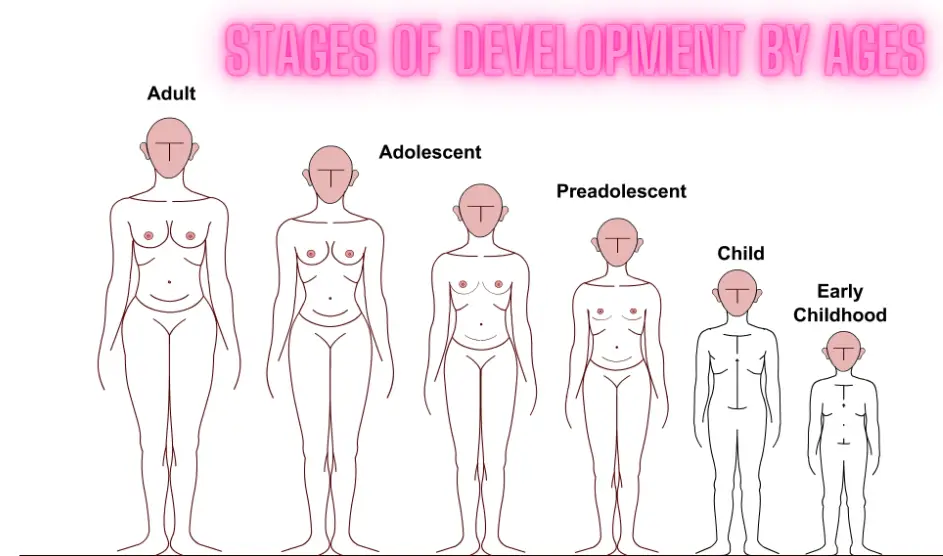The moment we are born, we set out on a path of maturation and expansion that will continue throughout our lives. Our physical, mental, and emotional capacities continue to develop as we move through childhood, adolescence, and into adulthood. This is true for all aspects of our development. The different stages of development that occur at different ages provide a helpful framework for comprehending these shifts.
Infancy (0-2 years) (0-2 years)
Infants go through a period of rapid development and constant skill acquisition during this stage. They first learn to hold their heads up before moving on to sitting, crawling, and eventually walking. The use of their senses and exploration of their surroundings both contribute to the development of their understanding of the world around them. At this point in their development, infants are extremely dependent on their caregivers for everything from their nutritional needs to the emotional support they require.
The Years Before Adulthood (2-6 years)
Children will continue to develop physically during this stage, but they will also begin to develop their cognitive and social skills. This stage lasts from 0 to 3 years. They improve their ability to communicate with one another and play roles while doing so. They also develop a greater sense of autonomy and begin to articulate their own thoughts, choices, and preferences. The early years of a child’s life are a period of rapid growth and development; consequently, the experiences that children have during this stage of their lives can have a significant influence on the rest of their lives.
Childhood in the Middle (6-11 years)
Children will continue to improve their cognitive abilities as well as their social skills during this stage. They improve both their ability to solve problems and their ability to think critically. They also start to get a sense of who they are and where they fit in the world at this point. In the middle years of childhood, children go through a period of increased independence during which they become more capable of taking care of themselves and begin to assume greater levels of responsibility.
Adolescence (12-18 years) (12-18 years)
During this time period, adolescents go through a period of significant change both physically and emotionally. They go through puberty, which is a time that can be challenging and baffling for some. Additionally, during this period of life, adolescents start to develop more complex cognitive abilities, such as the ability to think abstractly and reason. They begin to engage in more in-depth contemplation of their core values and beliefs, and they may begin to challenge established social norms and question established authorities. In their teenage years, people start to experiment with their sexuality and form close relationships with their peers.
Youth to Young Adulthood (18-40 years)
Young adults are still working on refining their sense of who they are and where they belong in the world during this stage of development. They frequently make important choices that will affect the rest of their lives, such as deciding on a career path, beginning a family, or continuing their education. When young adults are still trying to figure out who they are and what they want out of life, this is a period of time that is best suited for discovery and experimentation.
Middle Adulthood (40-65 years)
Adults often go through periods in their lives in which they experience significant change during this stage. They might start a new career, have children or grandchildren, or go through one of many other significant life transitions. The middle years of adulthood are marked by increased responsibility and, frequently, a concentration on establishing a foundation of stability and security. As adults reach this point in their lives, they typically start to think more deeply and reflectively about the decisions they’ve made in the past and the kind of future they envision for themselves.
Adulthood Later in Life (Over 65 Years Old)
Significant alterations, both physical and mental, frequently take place in the bodies and minds of older adults during this stage. They may decide to retire from their job and then have to deal with new difficulties associated with aging. Reflection and, more often than not, a concentration on one’s relationships and the legacy they will leave behind are common activities during late adulthood. Significant losses, such as the passing of friends and loved ones, can also be experienced by elderly people in their lives.
In conclusion, the stages of development by age provide a helpful framework for comprehending the changes that take place in our bodies and minds as we progress through life. While we are on this path of growth and development, we can be of greater assistance to ourselves and those around us if we acknowledge the particular difficulties and possibilities that come with each stage.

Can I simply say what a relief to uncover somebody that truly understands what they are discussing over the internet. You certainly know how to bring an issue to light and make it important. A lot more people must look at this and understand this side of your story. I was surprised that you are not more popular given that you most certainly have the gift.